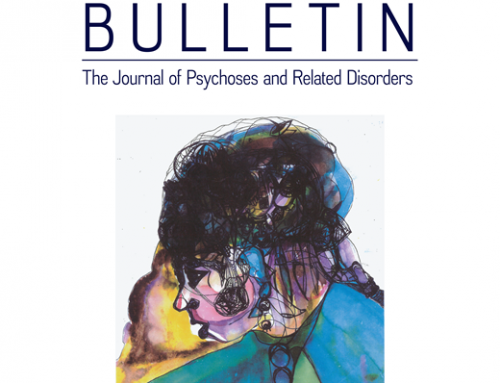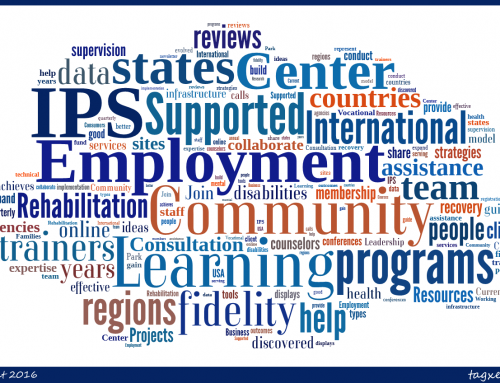Supported Employment Policy Bulletin – #2
For many people with a mental illness, employment is part of their recovery.
✔ The majority of people with severe mental illness want to work. Studies indicate that approximately 2 out of every 3 people with mental illness are interested in competitive employment,1-3 but less than 15% are currently employed.4,5
Individual Placement and Support (IPS) supported employment is evidence-based.
✔ IPS, also known as evidence-based supported employment, helps clients in community mental health services to become a part of the competitive labor market.6 IPS is nearly three times more effective than other vocational approaches in helping people with mental illness to work competitively.7
IPS is cost-effective.
✔ Severe mental illness is a leading contributor to the global burden of disease8 and constitutes the largest and fastest growing group of participants in Social Security disability programs.9 IPS is an excellent investment, with an annual cost of $4000 per client in 2010 dollars.10
✔ IPS is cost-effective when the costs of mental health treatment are considered. Several studies have found a reduction in community mental health treatment costs for supported employment clients,11-14 while other studies have found a reduction in psychiatric hospitalization days and emergency room usage after enrollment in supported employment.15-17 Service agencies that have replaced their day treatment programs with IPS have reduced service costs by 29%.12
✔ Another promising line of research has examined the long-term reduction in mental health treatment costs when clients return to work. A 10-year follow-up study of clients with co-occurring severe mental illness and substance abuse disorder found an average annual savings of over $16,000 per client in mental health treatment costs for steady workers compared to clients who remained out of the labor market.18
✔ An enormously promising area for cost savings concerns young adults who are experiencing early psychosis. If supported employment were available, the nation could save $368 million annually in Medicaid, Social Security and other federal and state programs.19
IPS has a positive long-term impact on overall well-being.
✔ People who obtain competitive employment through IPS have increased income, improved self-esteem, improved quality of life, and reduced symptoms.15,20-22 Approximately half of clients who enroll in IPS become steady workers and remain competitively employed a decade later.23,24
References
- McQuilken M, Zahniser JH, Novak J, Starks RD, Olmos A, Bond GR. The Work Project Survey: Consumer perspectives on work. Journal of Vocational Rehabilitation 2003;18:59-68.
- Mueser KT, Salyers MP, Mueser PR. A prospective analysis of work in schizophrenia. Schizophrenia Bulletin 2001;27:281-296.
- Rogers ES, Walsh D, Masotta L, Danley K. Massachusetts survey of client preferences for community support services: Final report. Boston: Center for Psychiatric Rehabilitation, 1991: 1-59.
- Rosenheck RA, Leslie D, Keefe R, et al. Barriers to employment for people with schizophrenia. American Journal of Psychiatry 2006;163:411-417.
- Salkever DS, Karakus MC, Slade EP, et al. Measures and predictors of community-based employment and earnings of persons with schizophrenia in a multisite study. Psychiatric Services 2007;58:315-324.
- Becker DR, Drake RE. A working life for people with severe mental illness. New York: Oxford Press, 2003.
- Bond GR, Drake RE, Becker DR. An update on randomized controlled trials of evidence-based supported employment. Psychiatric Rehabilitation Journal 2008;31:280-290.
- World Health Organization. World Health Report 2001. Mental health: New understanding, new hope. Geneva: World Health Organization, 2001.
- Drake RE, Bond GR, Thornicroft G, Knapp M, Goldman HH. Mental health disability: An international perspective. Journal of Disability Policy Studies in press.
- Latimer E, Bush P, Becker DR, Drake RE, Bond GR. How much does supported employment for the severely mentally ill cost? An exploratory survey of high-fidelity programs. Psychiatric Services 2004;55:401-406.
- Bond GR, Dietzen LL, Vogler KM, Katuin CH, McGrew JH, Miller LD. Toward a framework for evaluating costs and benefits of psychiatric rehabilitation: Three case examples. Journal of Vocational Rehabilitation 1995;5:75-88.
- Clark RE. Supported employment and managed care: Can they coexist? Psychiatric Rehabilitation Journal 1998;22(1):62-68.
- Latimer EA. Economic impacts of supported employment for the severely mentally ill. Canadian Journal of Psychiatry 2001;46:496-505.
- Schneider J, Boyce M, Johnson R, et al. Impact of supported employment on service costs and income of people with mental health needs. Journal of Mental Health 2009;18:533-542.
- Burns T, Catty J, White S, et al. The impact of supported employment and working on clinical and social functioning: Results of an international study of Individual Placement and Support. Schizophrenia Bulletin 2009;35:949-958.
- Henry AD, Lucca AM, Banks S, Simon L, Page S. Inpatient hospitalizations and emergency service visits among participants in an Individual Placement and Support (IPS) model program. Mental Health Services Research 2004;6:227-237.
- Rogers ES, Sciarappa K, MacDonald-Wilson K, Danley K. A benefit-cost analysis of a supported employment model for persons with psychiatric disabilities. Evaluation and Program Planning 1995;18:105-115.
- Bush PW, Drake RE, Xie H, McHugo GJ, Haslett WR. The long-term impact of employment on mental health service use and costs. Psychiatric Services 2009;60:1024-1031.
- Drake RE, Skinner JS, Bond GR, Goldman HH. Social Security and mental illness: Reducing disability with supported employment. Health Affairs 2009;28:761-770.
- Bond GR, Resnick SG, Drake RE, Xie H, McHugo GJ, Bebout RR. Does competitive employment improve nonvocational outcomes for people with severe mental illness? Journal of Consulting and Clinical Psychology 2001;69:489-501.
- Kukla M. The relationship between employment status and nonvocational outcomes for persons with severe mental illness enrolled in vocational programs: A longitudinal study. dissertation: Indiana University-Purdue University Indianapolis, 2010.
- Mueser KT, Becker DR, Torrey WC, et al. Work and nonvocational domains of functioning in persons with severe mental illness: A longitudinal analysis. Journal of Nervous and Mental Disease 1997;185:419-426.
- Becker DR, Whitley R, Bailey EL, Drake RE. Long-term employment outcomes of supported employment for people with severe mental illness. Psychiatric Services 2007;58:922-928.
- Salyers MP, Becker DR, Drake RE, Torrey WC, Wyzik PF. Ten-year follow-up of clients in a supported employment program. Psychiatric Services 2004;55:302-308.






Leave A Comment
You must be logged in to post a comment.